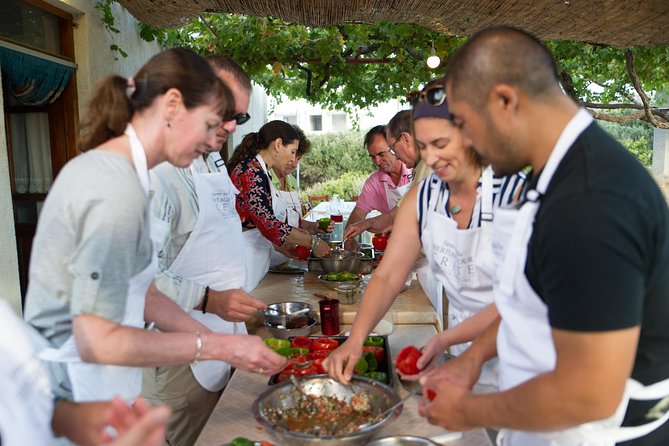Crete, Greece’s largest island, is renowned for its rich cultural heritage, stunning landscapes, and perhaps most enticingly, its extraordinary cuisine. The Cretan diet, a cornerstone of the broader Mediterranean diet, is celebrated for its health benefits and delectable flavors. For those looking to immerse themselves in the island’s gastronomic delights, Crete offers a plethora of culinary adventures, from cooking classes to food tours and beyond. Here’s a guide to exploring the culinary treasures of Crete.
Discovering the Cretan Diet
The Cretan diet is based on simple, fresh ingredients that reflect the island’s abundant natural resources. Olive oil, vegetables, fruits, whole grains, legumes, fish, and a moderate amount of dairy and meat form the foundation of this diet. Traditional Cretan dishes are often prepared with aromatic herbs like oregano, thyme, and rosemary, adding depth and flavor. To truly understand and appreciate this culinary tradition, there’s no better way than hands-on experiences through cooking classes and food tours.
Cooking Classes: Learning from the Masters
Taking a cooking class in Crete is an immersive way to learn the secrets of Cretan cuisine. These classes are typically led by local chefs or home cooks who share family recipes passed down through generations. Participants get to work with fresh, local ingredients and learn traditional cooking techniques.
- Farm-to-Table Experiences : Some cooking classes take place on family-owned farms where participants can harvest ingredients directly from the source. Imagine picking ripe tomatoes, cucumbers, and herbs from a sun-drenched garden, then using these ingredients to prepare a traditional Cretan salad (dakos) or a hearty vegetable stew. These farm-to-table experiences provide a deep connection to the land and the food it produces.
- Seafood Mastery : Crete’s coastline offers an abundance of seafood, and many cooking classes focus on preparing fresh fish and shellfish. Participants might learn how to make dishes like grilled octopus, fish soup (kakavia), or stuffed calamari. These classes often include a visit to a local fish market, where chefs teach how to select the freshest catches.
- Bakery Delights : For those with a sweet tooth, baking classes offer the chance to learn how to make traditional Cretan pastries like kalitsounia (sweet cheese pies), koulourakia (butter cookies), and the famous Cretan wedding cookies, kourabiedes. These classes provide insights into the island’s baking traditions and the significance of these treats in Cretan culture. Food Tours: Tasting Crete
Food tours are another fantastic way to explore Cretan cuisine. These tours typically include visits to local markets, tavernas, wineries, and olive oil mills, offering a comprehensive taste of the island’s culinary landscape.
- Market Tours : Exploring local markets is a sensory delight. Guided tours through markets in cities like Heraklion or Chania introduce visitors to the vibrant array of fresh produce, cheeses, olives, spices, and more. Guides often include tastings of local specialties such as cured meats, artisanal cheeses, and sweet treats like loukoumades (honey-soaked doughnuts).
- Taverna Hopping : Taverna tours take participants to a selection of traditional eateries, each known for specific dishes. This might include sampling meze (small plates) like stuffed grape leaves (dolmades), grilled sausages (loukaniko), or savory pies (spanakopita). These tours highlight the diversity of Cretan cuisine and the convivial atmosphere of dining in a taverna.
- Wine and Olive Oil Tours : Crete is famous for its wine and olive oil, both integral to the Cretan diet. Wine tours often include visits to vineyards and wineries where guests can taste varietals such as Vidiano, Liatiko, and Kotsifali. Olive oil tours typically visit olive groves and mills, providing an in-depth look at the production process and the opportunity to taste different grades of olive oil. Beyond the Plate: Cultural and Culinary Festivals
Crete hosts several festivals throughout the year that celebrate its culinary traditions. These festivals often include cooking demonstrations, tastings, and competitions, providing a festive atmosphere to learn about and enjoy Cretan food.
- The Rethymno Renaissance Festival : This festival combines cultural performances with culinary events, showcasing traditional Cretan music, dance, and food.
- The Chania Wine Festival : Held in the summer, this festival features local wines and food pairings, highlighting the island’s winemaking traditions.
- The Feast of St. Titus in Heraklion : This religious festival includes a large fair where visitors can sample a wide array of Cretan dishes and sweets.
Conclusion
Culinary adventures in Crete offer a delicious gateway to understanding the island’s culture and history. Whether through hands-on cooking classes, immersive food tours, or vibrant culinary festivals, visitors can experience the full richness of Cretan cuisine. These adventures not only satisfy the palate but also provide a deeper appreciation of the traditions and people who make Crete a unique and unforgettable culinary destination.


